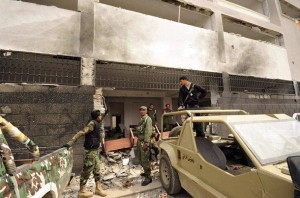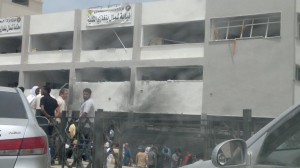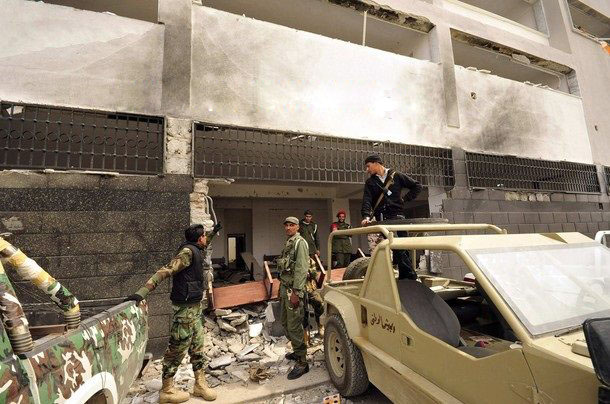By Michel Cousins.
Benghazi, 27 April:
The High Court in Benghazi was bombed in the early hours of the morning, Friday. Seven other . . .[restrict]explosions were reported across the city shortly afterwards.
Shortly after four in the morning, city resident were woken up by loud explosions as four bombs shook the high court building; four security guards were slightly injured. The attack left a gaping hole in the front of the building and almost all the windows blown out. Windows were also shattered in the neighbouring NOC building and at the 7 October hospital opposite, where another person was injured by the blasts.

Diplomats in the city said they had been told by officials that the four bombs had been left in attaché cases outside the high court.
The bombings are seen as connected with the abortive attempt by unknown gunmen to storm Benghazi’s central prison nine hours earlier. Four prison security guards were seriously wounded in that attack.
The Islamist group Takthir wal Hijra, which is said to have a cell in Derna, have been accused of being involved in both attacks, which are also believed to be linked to the assassination last July, of the NTC’s of Chief of Staff Abdel Fatah Younis. Last night, however, government sources insisted that the attack on the prison was the work of an ordinary criminal gang, and not Islamists. That was before this latest attack.

One of those accused of involvement in Yunis’ slaying, Salem Obeidi, is being held at the prison. He is said to come from Derna.
It was also reported last night that two other men connected to the killing were also being held at the prison. On Wednesday, however, only Obeidi appeared at a military court in Benghazi at the start of his trial on murder charges. According to military prosecution spokesman Sulaiman Al-Ramali, sixteen others, mostly soldiers, are also accused but have not yet been caught.
The court adjourned proceedings until 30 May. It is reported that no defence lawyers turned up at the court, possibly because of confusion as to the timing.
Outside the wrecked high court building which has been in operation only a few months — the old High court was gutted during the revolution — a large crowd of Benghazi residents gathered this morning and vented their anger against the bombers.
“The people who did this are bad people,” said Abdullah Idris, a local businessman. “They don’t want the country to be settled. We don’t like this. Libya is not Iraq or Somalia. The revolution is over. We want peace not bombs. We don’t need to blow anything up. Qaddafi has gone, he said. The time for violence was over.”
Another angry onlooker, immigration official Awad Yusuf, said much the same: “We don’t want it. These people do not represent us. We support the police.” He was not sure if Takfir wal Hijra were responisble. “Maybe,” he said. But he was sure that those involved were enemies of Libya.
Another local resident who had turned up to see the extent of the damage said that the choice of target, the high court, showed the attackers’ total contempt for the law and they were out to destroy Libya’s new-won freedoms.
Some in the crowd, however, vented their anger at the police saying that they should be doing more to ensure security and order.
[/restrict]










